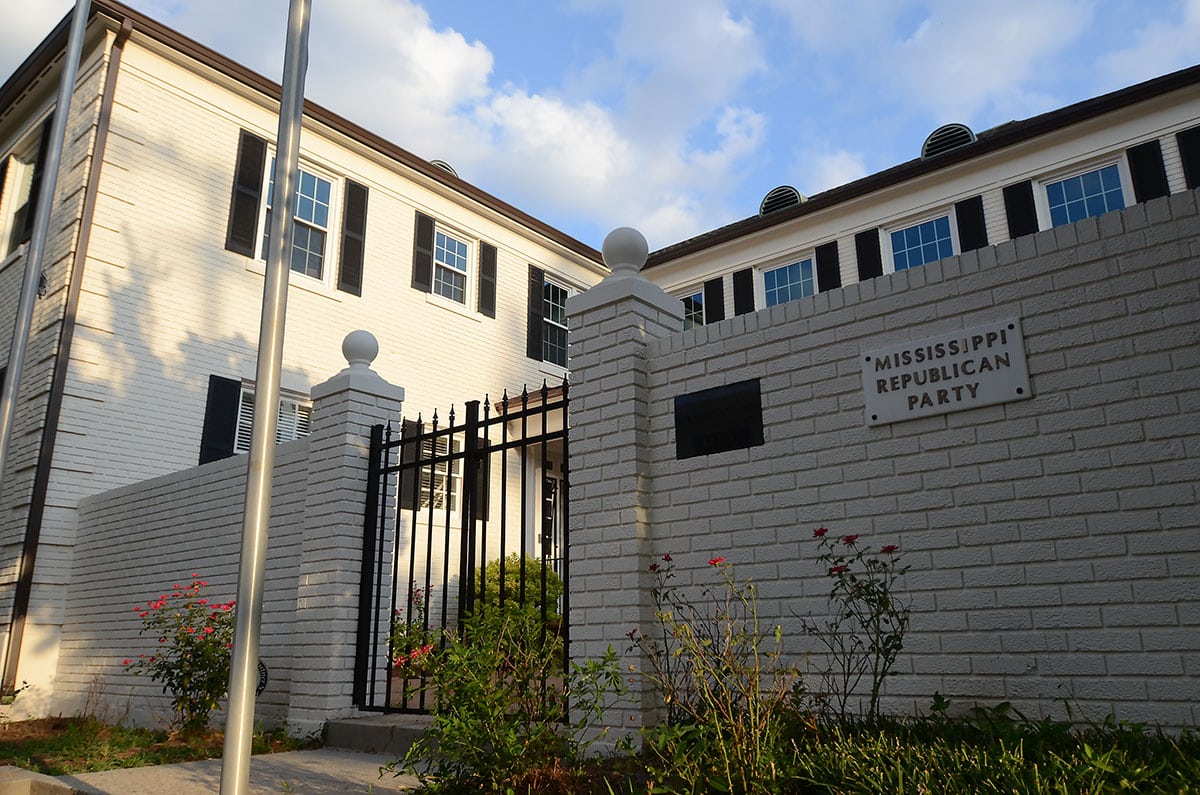Mississippi Today
State Republican Party raises fees for candidates to run for some public offices

If Mississippians want to qualify to run for state office as a Republican, they’ll first have to open their wallets wider than ever.
Mississippi Republican Party leaders voted last year to increase candidate qualifying fees, the amount a candidate has to pay to run for office, to the maximum amount allowed under state law for all federal, statewide and regional offices in the state.
Mississippi GOP Chairman Frank Bordeaux told Mississippi Today the fee increase is comparable to the figure the Republican Party in other states requires for their candidates to run for office.
“This increase is a way for us to make sure we can continue to provide quality resources to our Republican nominees,” Bordeaux said.
The Democratic Party, on the other hand, opted to keep their fees the same as prior years.
Qualifying fees for all political offices, regardless of party affiliation, were previously spelled out in statute. But state lawmakers in 2022 voted to give political parties a range for how much they can charge candidates and allow the party leaders to choose the specific amount.
The minimum fee parties can charge gubernatorial candidates, for example, is $1,000, and the maximum amount is $5,000. The Democratic Party opted to keep their fee at $1,000, while the GOP decided to raise the fee to $5,000.
New GOP candidate qualifying fees:
- U.S. Senator: $5,000 (previously $1,000)
- U.S. Representative: $2,500 (previously $500)
- Governor: $5,000 (previously $1,000)
- Other statewide offices: $2,500 (previously $500)
- Transportation Commissioner: $2,500 (previously $500)
- Public Service Commissioner: $2,500 (previously $500)
- District Attorney: $250 (unchanged)
- State Legislature: $250 (unchanged)
Republican state Sen. Joey Fillingane of Sumrall argued in favor of the 2022 legislation during the legislative session and said at the time that the main reasons for the new law was to give parties more latitude to conduct their primary elections and ensure only serious candidates run for office.
“I think we had a situation not too long ago where maybe a truck driver put his name on the ballot, didn’t campaign, didn’t really run,” Fillingane said. “He was running his 18-wheeler truck and ended up winning a major party primary for a major office in Mississippi. And I think you can argue that was a direct result of having extremely low filing fees in that particular race.”
Fillingane was referring to Robert Gray, a truck driver who won the 2015 Democratic nomination for governor and was handily defeated by former Republican Gov. Phil Bryant.
Opponents of the recent legislation believed higher qualifying fees could bar candidates from running for office and deter a competitive democratic system.
The final version of the bill passed the House 84-31 and the Senate 33-10. Republican Gov. Tate Reeves signed it into law.
Bordeaux doubted increased fees would keep candidates from entering the Republican primary because serious candidates are usually able to raise larger amounts of money. He pointed to the state’s recent gubernatorial election, when the Republican and Democratic nominees for the office collectively raised over $17 million this past year.
This is now the first time under the new law that the state Republican Party has raised its qualifying fees. The new fees will primarily impact the Mississippi’s U.S. Senate race next year, when incumbent U.S. Sen. Roger Wicker is up for reelection.
Wicker, a Tupelo resident, has previously announced he’s running for reelection. But two lower-profile candidates, Republican state Rep. Dan Eubanks of DeSoto County and retired Marine Col. Ghannon Burton, announced they intend to challenge Wicker in the Republican primary.
The qualification period for the U.S. Senate, according to the Secretary of State’s website, opens on Jan. 2 and closes 10 days later on Jan. 12.
This article first appeared on Mississippi Today and is republished here under a Creative Commons license.
Mississippi Today
A win for press freedom: Judge dismisses Gov. Phil Bryant’s lawsuit against Mississippi Today
Madison County Circuit Court Judge Bradley Mills dismissed former Gov. Phil Bryant’s defamation lawsuit against Mississippi Today on Friday, ending a nearly two-year case that became a beacon in the fight for American press freedom.
For the past 22 months, we’ve vigorously defended our Pulitzer Prize-winning reporting and our characterizations of Bryant’s role in the Mississippi welfare scandal. We are grateful today that the court, after careful deliberation, dismissed the case.
The reporting speaks for itself. The truth speaks for itself.
This judgment is so much more than vindication for Mississippi Today — it’s a monumental victory for every single Mississippian. Journalism is a public good that all of us deserve and need. Too seldom does our state’s power structure offer taxpayers true government accountability, and Mississippians routinely learn about the actions of their public officials only because of journalism like ours. This reality is precisely why we launched our newsroom nine years ago, and it’s why we devoted so much energy and spent hundreds of thousands of dollars defending ourselves against this lawsuit. It was an existential threat to our organization that took time and resources away from our primary responsibilities — which is often the goal of these kinds of legal actions. But our fight was never just about us; it was about preserving the public’s sacred, constitutional right to critical information that journalists provide, just as our nation’s Founding Fathers intended.
Mississippi Today remains as committed as ever to deep investigative journalism and working to provide government accountability. We will never be afraid to reveal the actions of powerful leaders, even in the face of intimidation or the threat of litigation. And we will always stand up for Mississippians who deserve to know the truth, and our journalists will continue working to catalyze justice for people in this state who are otherwise cheated, overlooked, or ignored.
We appreciate your support, and we are honored to serve you with the high quality, public service journalism you’ve come to expect from Mississippi Today.
READ MORE: Judge Bradley Mills’ order dismissing the case
READ MORE: Mississippi Today’s brief in support of motion to dismiss
This article first appeared on Mississippi Today and is republished here under a Creative Commons Attribution-NoDerivatives 4.0 International License.
Mississippi Today
Meet Willye B. White: A Mississippian we should all celebrate
In an interview years and years ago, the late Willye B. White told me in her warm, soothing Delta voice, “A dream without a plan is just a wish. As a young girl, I had a plan.”
She most definitely did have a plan. And she executed said plan, as we shall see.
And I know what many readers are thinking: “Who the heck was Willye B. White?” That, or: “Willye B. White, where have I heard that name before?”
Well, you might have driven an eight-mile, flat-as-a-pancake stretch of U.S. 49E, between Sidon and Greenwood, and seen the marker that says: “Willye B. White Memorial Highway.” Or you might have visited the Olympic Room at the Mississippi Sports Hall of Fame and seen where White was a five-time participant and two-time medalist in the Summer Olympics as a jumper and a sprinter.
If you don’t know who Willye B. White was, you should. Every Mississippian should. So pour yourself a cup of coffee or a glass of iced tea, follow along and prepare to be inspired.
Willye B. White was born on the last day of 1939 in Money, near Greenwood, and was raised by grandparents. As a child, she picked cotton to help feed her family. When she wasn’t picking cotton, she was running, really fast, and jumping, really high and really long distances.
She began competing in high school track and field meets at the age of 10. At age 11, she scored enough points in a high school meet to win the competition all by herself. At age 16, in 1956, she competed in the Summer Olympics at Melbourne, Australia.
Her plan then was simple. The Olympics, on the other side of the world, would take place in November. “I didn’t know much about the Olympics, but I knew that if I made the team and I went to the Olympics, I wouldn’t have to pick cotton that year. I was all for that.”
Just imagine. You are 16 years old, a high school sophomore, a poor Black girl. You are from Money, Mississippi, and you walk into the stadium at the Melbourne Cricket Grounds to compete before a crowd of more than 100,000 strangers nearly 10,000 miles from your home.
She competed in the long jump. She won the silver medal to become the first-ever American to win a medal in that event. And then she came home to segregated Mississippi, to little or no fanfare. This was the year after Emmett Till, a year younger than White, was brutally murdered just a short distance from where she lived.
“I used to sit in those cotton fields and watch the trains go by,” she once told an interviewer. “I knew they were going to some place different, some place into the hills and out of those cotton fields.”
Her grandfather had fought in France in World War I. “He told me about all the places he saw,” White said. “I always wanted to travel and see the places he talked about.”
Travel, she did. In the late 1950s there were two colleges that offered scholarships to young, Black female track and field athletes. One was Tuskegee in Alabama, the other was Tennessee State in Nashville. White chose Tennessee State, she said, “because it was the farthest away from those cotton fields.”
She was getting started on a track and field career that would take her, by her own count, to 150 different countries across the globe. She was the best female long jumper in the U.S. for two decades. She competed in Olympics in Melbourne, Rome, Tokyo, Mexico City and Munich. She would compete on more than 30 U.S. teams in international events. In 1999, Sports Illustrated named her one of the top 100 female athletes of the 20th century.
Chicago became White’s home for most of adulthood. This was long before Olympic athletes were rich, making millions in endorsements and appearance fees. She needed a job, so she became a nurse. Later on, she became an public health administrator as well as a coach. She created the Willye B. White Foundation to help needy children with health and after school care.
In 1982, at age 42, she returned to Mississippi to be inducted into the Mississippi Sports Hall of Fame and was welcomed back to a reception at the Governor’s Mansion by Gov. William Winter, who introduced her during induction ceremonies. Twenty-six years after she won the silver medal at Melbourne, she called being hosted and celebrated by the governor of her home state “the zenith of her career.”
Willye B. White died of pancreatic cancer in a Chicago hospital in 2007. While working on an obituary/column about her, I talked to the late, great Ralph Boston, the three-time Olympic long jump medalist from Laurel. They were Tennessee State and U.S. Olympic teammates. They shared a healthy respect from one another, and Boston clearly enjoyed talking about White.
At one point, Ralph asked me, “Did you know Willye B. had an even more famous high school classmate.”
No, I said, I did not.
“Ever heard of Morgan Freeman?” Ralph said, laughing.
Of course.
“I was with Morgan one time and I asked him if he ever ran track,” Ralph said, already chuckling about what would come next.
“Morgan said he did not run track in high school because he knew if he ran, he’d have to run against Willye B. White, and Morgan said he didn’t want to lose to a girl.”
This article first appeared on Mississippi Today and is republished here under a Creative Commons Attribution-NoDerivatives 4.0 International License.![]()
Mississippi Today
Early voting proposal killed on last day of Mississippi legislative session
Mississippi will remain one of only three states without no-excuse early voting or no-excuse absentee voting.
Senate leaders, on the last day of their regular 2025 session, decided not to send a bill to Gov. Tate Reeves that would have expanded pre-Election Day voting options. The governor has been vocally opposed to early voting in Mississippi, and would likely have vetoed the measure.
The House and Senate this week overwhelmingly voted for legislation that established a watered-down version of early voting. The proposal would have required voters to go to a circuit clerk’s office and verify their identity with a photo ID.
The proposal also listed broad excuses that would have allowed many voters an opportunity to cast early ballots.
The measure passed the House unanimously and the Senate approved it 42-7. However, Sen. Jeff Tate, a Republican from Meridian who strongly opposes early voting, held the bill on a procedural motion.
Senate Elections Chairman Jeremy England chose not to dispose of Tate’s motion on Thursday morning, the last day the Senate was in session. This killed the bill and prevented it from going to the governor.
England, a Republican from Vancleave, told reporters he decided to kill the legislation because he believed some of its language needed tweaking.
The other reality is that Republican Gov. Tate Reeves strongly opposes early voting proposals and even attacked England on social media for advancing the proposal out of the Senate chamber.
England said he received word “through some sources” that Reeves would veto the measure.
“I’m not done working on it, though,” England said.
Although Mississippi does not have no-excuse early voting or no-excuse absentee voting, it does have absentee voting.
To vote by absentee, a voter must meet one of around a dozen legal excuses, such as temporarily living outside of their county or being over 65. Mississippi law doesn’t allow people to vote by absentee purely out of convenience or choice.
Several conservative states, such as Texas, Louisiana, Arkansas and Florida, have an in-person early voting system. The Republican National Committee in 2023 urged Republican voters to cast an early ballot in states that have early voting procedures.
Yet some Republican leaders in Mississippi have ardently opposed early voting legislation over concerns that it undermines election security.
This article first appeared on Mississippi Today and is republished here under a Creative Commons license.
.
-

 Mississippi Today4 days ago
Mississippi Today4 days agoPharmacy benefit manager reform likely dead
-

 News from the South - Kentucky News Feed5 days ago
News from the South - Kentucky News Feed5 days agoTornado practically rips Bullitt County barn in half with man, several animals inside
-

 News from the South - Alabama News Feed5 days ago
News from the South - Alabama News Feed5 days ago'I think everybody's concerned': Mercedes-Benz plant eyeing impact of imported vehicle tariffs
-

 News from the South - Oklahoma News Feed7 days ago
News from the South - Oklahoma News Feed7 days agoLife of David Boren memorialized in ceremony attended by hundreds
-

 News from the South - Missouri News Feed6 days ago
News from the South - Missouri News Feed6 days agoThunderstorms drench areas south of St. Louis
-

 News from the South - Alabama News Feed6 days ago
News from the South - Alabama News Feed6 days ago41st annual Bloomin Festival Arts and Crafts Fair (April 5 & 6) | March 31, 2025 | News 19 at 9 a.m.
-

 News from the South - Florida News Feed4 days ago
News from the South - Florida News Feed4 days agoFlorida special election results: GOP keeps 2 U.S. House seats in Florida
-

 News from the South - Louisiana News Feed4 days ago
News from the South - Louisiana News Feed4 days agoMother turns son's tragedy into mental health mission













































